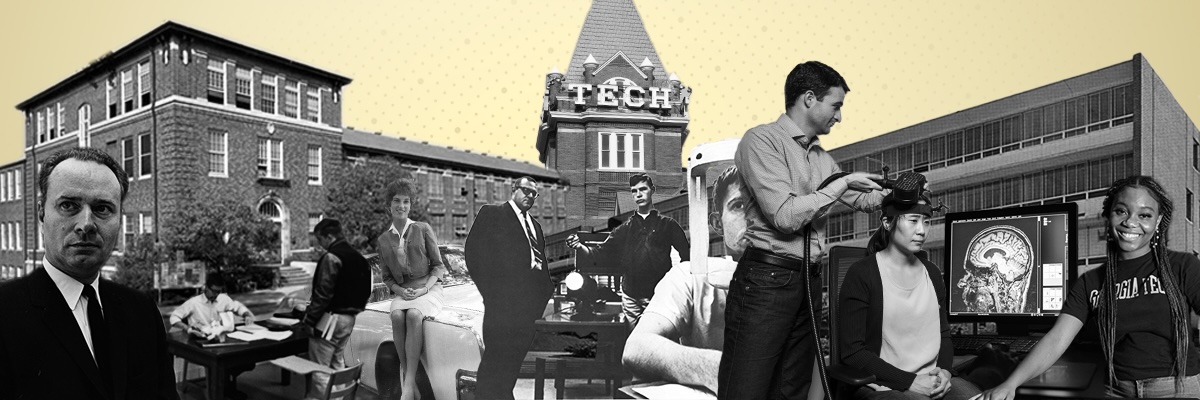 A collage of historical Psychology people and places. (Credit: Audra Davidson)
A collage of historical Psychology people and places. (Credit: Audra Davidson)
Feb 7, 2024 — Atlanta, GA
Since the early days of the Institute, Georgia Tech students have explored aspects of the mind, brain, and behavior through psychology. What started as one or two courses in business psychology has since erupted into dynamic, nationally ranked psychology research and academic programs that serve hundreds of students annually.
“Beginning with just a few courses in applied psychology, psychology at Georgia Tech has evolved into one of the most dynamic and distinctive psychology schools globally,” says Tansu Celikel, professor and chair of the School of Psychology. “Our educational and research endeavors are designed to meet the needs of our students and the society as we explore the causal interplay between the mind, brain, behavior and technology.”
Though psychology courses had been taught at the Institute prior, it was in 1924 that psychology became a core requirement for three of Tech’s then 12 degree programs, solidifying it as a staple of the Georgia Tech curriculum.
To commemorate the past century of psychology at Georgia Tech, we’re taking a deep dive into its storied history at the Institute.
An applied approach (1924-1944)
In the early 1920s, the Georgia School of Technology (as it was then called) was in the process of growing from a narrowly focused trade school to a technological university. A major mark in this transition was the addition of graduate and undergraduate programs in general science in 1922 and 1923. Psychology was a key area of study impacted by this expansion, becoming a requirement for these new general science degrees in addition to degrees in commerce (now known as business) and industrial education (training for industry and trade workers and managers) in 1924.
Psychology in service (1945-1958)
Psychology began to distinguish itself in 1945 under the leadership of Professor Joseph Moore, becoming an official department in service to degree programs at Tech. As described in the 1952 edition of Georgia Tech’s yearbook, The Blueprint, the philosophy of the department was “to stress the importance of the human factor in all phases of engineering,” and to “make students sensitive to the whole man, his attitudes, his feelings, his fears, and his desire for recognition and security.”
Though the department itself did not grant degrees, general and specialized psychology electives became popular courses for Tech’s engineering, architecture, and science majors, making it a key pillar of the Institute.
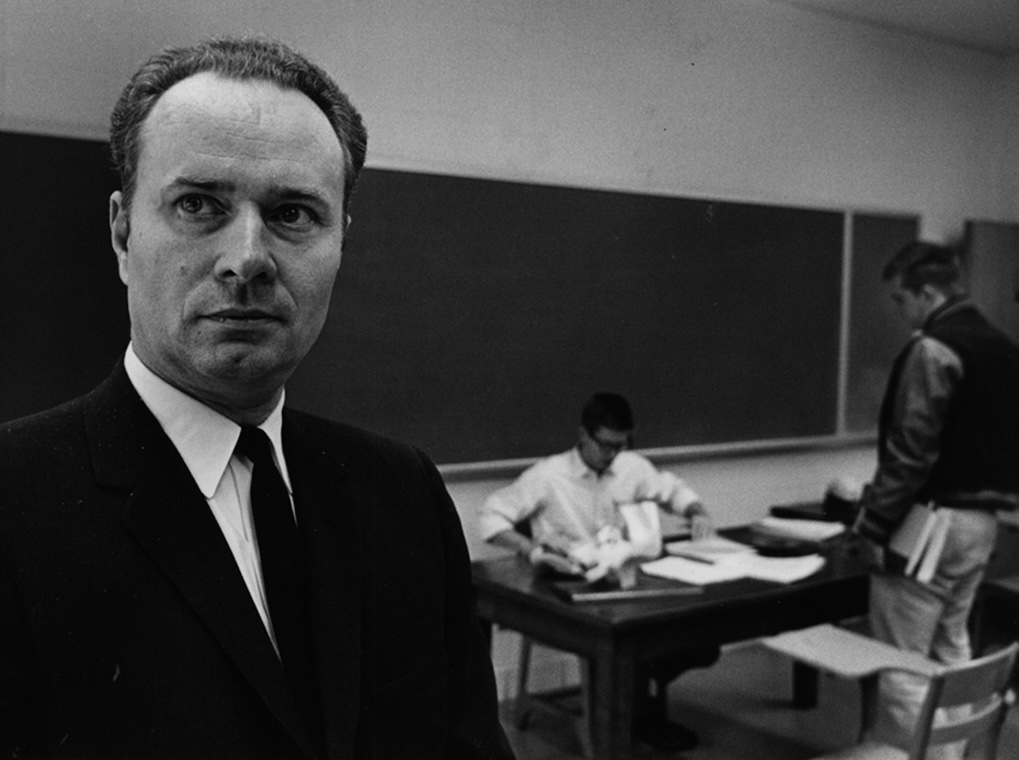
Edward Loveland, a professor, the School’s second chair, and a major player in the establishment of the School. (Photo: Georgia Tech Blueprint, 1965)
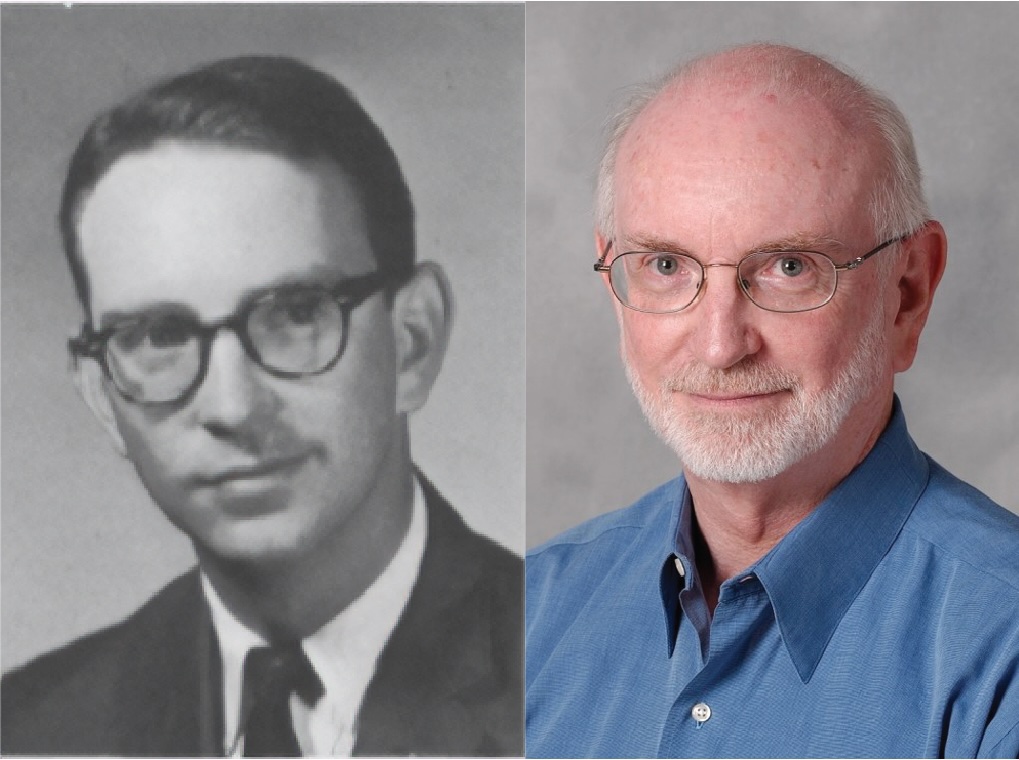
Left: M. Jackson “Jack” Marr was a member of the School’s inaugural class, graduating with a B.S. in Applied Psychology in 1961 (Photo: Georgia Tech Blueprint, 1961). Right: Marr returned to Tech as an assistant professor in 1965, where he served as a faculty member until his retirement.
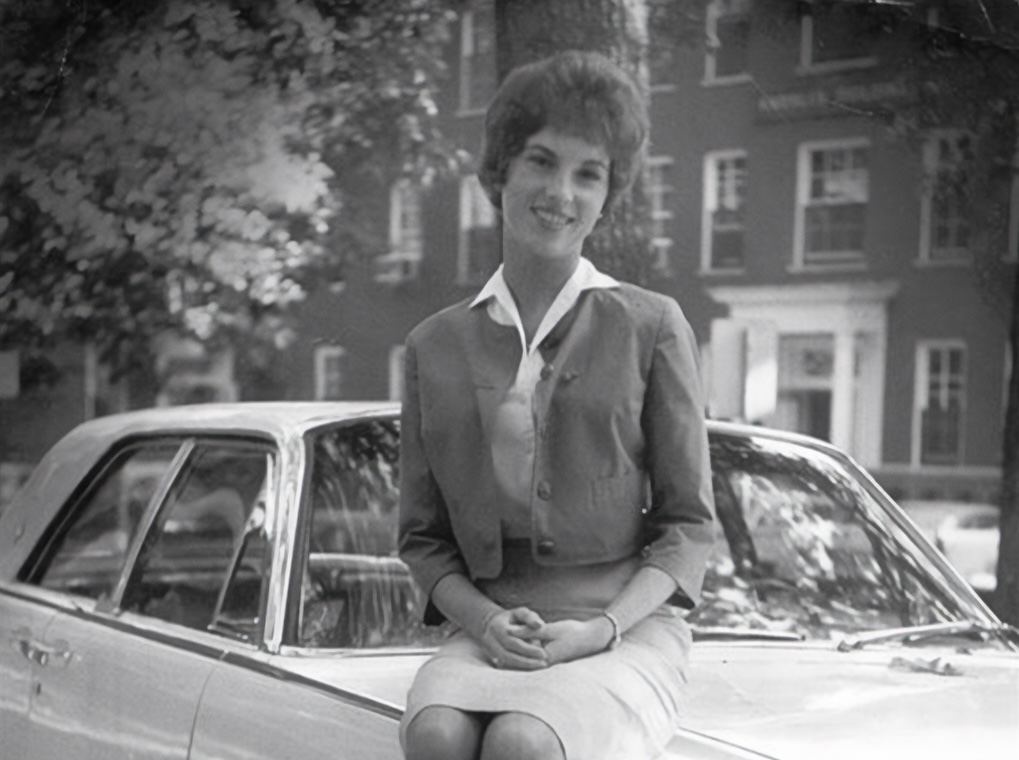
Margaret Stephens Martin (1941-2021) was the first woman to graduate from the School of Psychology at Georgia Tech. In an interview with the Alumni Association, Martin described the encouragement she received from both Loveland and Marr to pursue her degrees.
A school is born (1959-1971)
The Psychology Department was officially established as the School of Applied Psychology in 1959, later renamed as the School of Psychology, under the leadership of Professors Joseph Moore and Edward Loveland. One of the smallest schools on campus and housed in the College of Sciences and Liberal arts, graduates of the school were granted a Bachelor of Science in Applied Psychology.
“They selected 10 undergraduates to be the first class of the School of Psychology,” says M. Jackson “Jack” Marr, a member of the School’s inaugural class who returned to Tech as an assistant professor in 1965.
“It's important to realize that Georgia Tech at that time was essentially a military school,” says Marr, now a professor emeritus in the School. Psychology’s curriculum continued to focus on applied and quantitative courses, requiring students to take several business, engineering, science, and math courses in addition to psychology classes. Graduating with the School’s first class of undergraduates in 1961, Marr notes that “the curriculum was absolutely unique, and probably still is.”
Ramping up research (1972-1989)
 |
| Terry Maple (1946-2023) served as a professor for many years and is credited with revitalizing Zoo Atlanta and establishing a progressive animal behavior research program in collaboration with Georgia Tech. |
“In the ‘70s and ‘80s, research began to become really, really important,” says Marr. Across the Institute, there was a new focus on establishing Georgia Tech as a rigorous research entity. Furthering this mission, psychology established initial research programs in cognitive psychology, animal behavior, and behavior analysis in the early ‘70s, as well as some of the nation’s first programs in industrial/organizational psychology and engineering psychology.
As research in the School progressed, Anderson “Andy” Smith, professor and chair of the School from 1986 to 1994, led the development of an additional research program on human aging.
“Andy set out to build a group of researchers who studied the effects of aging on cognition and built it into the absolutely best in the world in that area,” says Randall “Randy” Engle, professor and chair of the School from 1994 to 2008. Continuing today as Adult Development and Aging, the program is still considered a pillar of the School’s research.
Studies in animal behavior also became a staple of the program, led largely by professors Dick Davenport and Terry Maple, says Marr.
“Terry Maple is perhaps best known for his complete overhaul of Zoo Atlanta,” Marr adds. In his revitalization of Zoo Atlanta, Maple established a vibrant research program, fostering collaborations between the School, the zoo, and the Yerkes National Primate Research Center.
Though the animal behavior research program was eventually sunset, “many excellent graduate students earned their degrees doing research at Zoo Atlanta,” says Marr. “Most of them have gone on to major research positions at zoos and universities across the country.”
Psychology in Sciences (1990-2008)
When he arrived at Georgia Tech in 1988, Psychology Professor Richard Catrambone says that, “the School of Psychology, unbeknownst to me, was really in the middle of changing.”
“I'd say within Georgia Tech in general, it was still very much engineering focused [when I arrived],” recalls Catrambone. “There began a bit of a push, just timing with my arrival, of trying to start elevating the sciences and other areas a bit more.”
Reflecting this change, the College of Sciences and Liberal Arts was broken up in 1990 to accommodate the growth of its academic and research programs, forming the College of Computing, the Ivan Allen College of Management, Policy, and International Affairs (later separated into the Ivan Allen College of Liberal Arts and the Scheller College of Business), and the College of Sciences. The School was part of this historic restructuring, joining the newly formed College of Sciences.
“I think it's a characteristic of Georgia Tech, that really dates from those early days, of collaborating with other departments,” says Engle, “and part of it is because psychology was now in a College of Sciences.” This expansion of collaboration resulted in the initiation of a joint master’s degree in human-computer interaction with the College of Computing in 1997.
The field of psychology itself was also expanding, most notably in the areas of neuroscience and cognitive psychology. With these advancements, the School’s research was restructured into five areas: industrial/organizational, engineering, adult development and aging, quantitative psychology (formed in 2005), and cognition and brain science (formed in 2007).
Neuroscience and beyond (2009-2024)
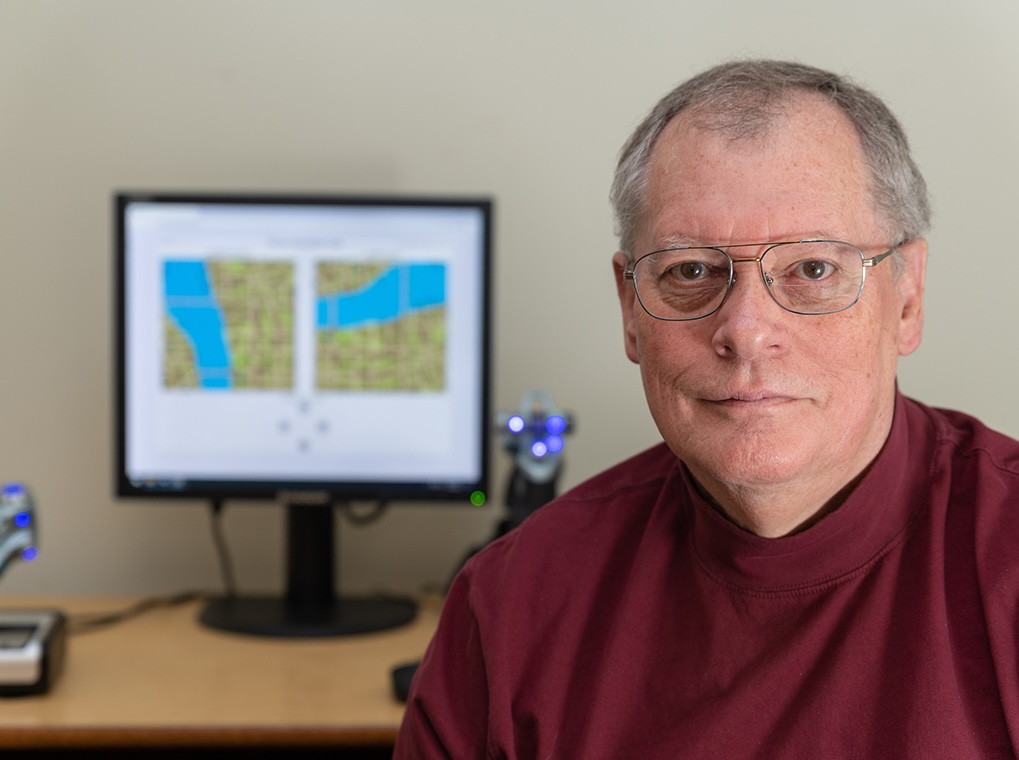 |
| Randall “Randy” Engle is a professor in the School and served as chair from 1994 to 2008. Engle's efforts were key to the School's relocation to the J.S. Coon building in 2003 and the establishment of the Center for Advanced Brain Imaging. (Photo: Rob Felt) |
The School’s research continued to expand in the areas of neuroscience and cognitive psychology, notably marked with the establishment of the Georgia State/Georgia Tech Center for Advanced Brain Imaging (CABI) in 2009 led by Randy Engle. The Center is equipped with several neuroimaging technologies, giving Tech researchers access to entirely new research methodologies.
"I think the biggest change in psychology in 20 years is the integration of behavioral neuroscience and cognitive neuroscience in mainstream psychology,” says James Roberts, associate professor in Psychology. “I think we really have benefited from that, especially here at Georgia Tech — and the biggest thing that led to that was Randy Engle’s involvement with the Institute’s administration to start CABI.”
All of Psychology’s research programs have grown since CABI’s formation, and many of the new faculty joining Psychology have had a neuroscience focus. Today, the School’s commitment to translate fundamental insights on the organization of mind, brain and behavior to improve human condition and well-being, as well as to inspire future technologies, shape its educational and research programs. With new undergraduate programs in neuroscience and the science of mental health and wellbeing, both the research and academic future of the School look bright.
“Spanning over two and a half millennia, psychology's journey from a branch of philosophy to an experimental science is a testament to human curiosity and ingenuity,” says Celikel. “As we embark upon a new era, psychology is transformed into an interdisciplinary field. This integration promises a mechanistic understanding of the mind, brain, and behavior.
“With its rapidly growing interdisciplinary educational and research programs, emphasis on cross disciplinary and translational collaborations, quantitative training, critical thinking, and societal impact, the School of Psychology is poised to lead the way into this exciting new era in psychology.”
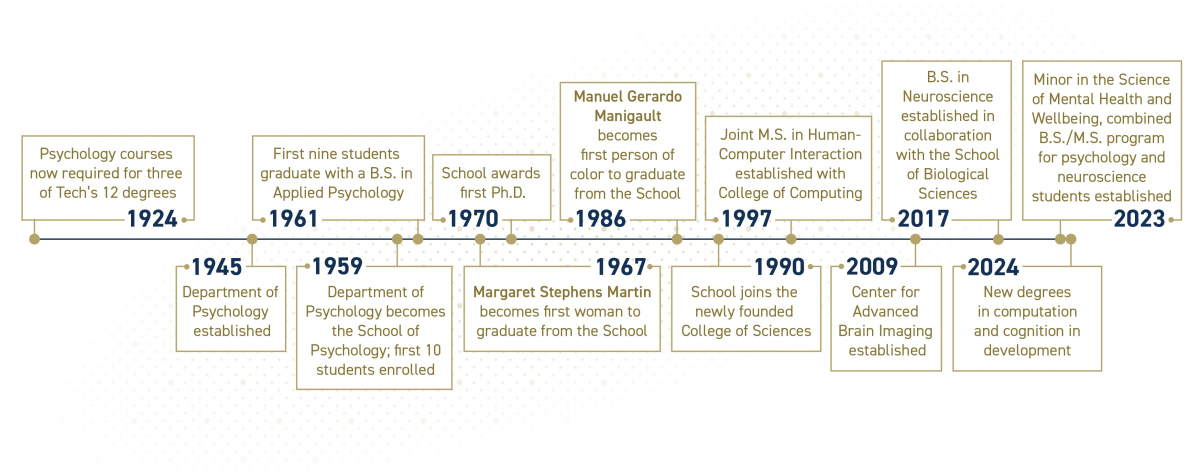 A timeline of Psychology at Georgia Tech. (Credit: Audra Davidson)
A timeline of Psychology at Georgia Tech. (Credit: Audra Davidson)
About Georgia Tech
The Georgia Institute of Technology, or Georgia Tech, is one of the top public research universities in the U.S., developing leaders who advance technology and improve the human condition.
The Institute offers business, computing, design, engineering, liberal arts, and sciences degrees. Its more than 45,000 undergraduate and graduate students, representing 50 states and more than 148 countries, study at the main campus in Atlanta, at campuses in France and China, and through distance and online learning.
As a leading technological university, Georgia Tech is an engine of economic development for Georgia, the Southeast, and the nation, conducting more than $1 billion in research annually for government, industry, and society.
Related News
Contact
Writer and Contact:
Audra Davidson
Communications Officer II, College of Sciences at Georgia Tech


